
6,500 hospital workers to strike unless gov’t closes border with mainland: union
by Coconuts Hong KongAround 6,500 nurses and doctors have pledged to go on strike unless the government completely closes the border with the mainland in order to stem the spread of the potentially fatal Wuhan coronavirus.
Representatives of the recently formed Hospital Authority Employees Alliance made the announcement at a press briefing this afternoon, saying they will hold an extraordinary general meeting tomorrow to vote and discuss the strike action and other possible industrial actions.
The representatives said the strike is being called because of the government’s “inadequate support” in combating the Wuhan coronavirus, particularly its refusal to completely seal the border with the mainland.
Ivan Law, the vice chairman of the of the HAEA said that members are “reluctant” to strike given the impact it would have on medical services, but said that morale in the city’s hospitals had reached “a breaking point,” and that even if staff are provided with the appropriate gear, it’s not effective as long as the border remains open.
Law said that of the people who have signed up to strike, about 70 percent are nurses and just over 8 percent are doctors.
He said that the union had made a number of appeals to the Hospital Authority on Sunday, which included preventing anyone from the mainland entering and providing more beds for patients that need to be isolated. However, the HA have not yet responded to these calls.
“We don’t want to [strike], but if the government forces us, then we have no choice,” said Law.
If the strike goes ahead, it will be the first of its kind coordinated by the HAEA, which only formed in November.
The union has made headlines in local media outlets in recent days with long queues of people spotted lining up to register to join amid the Wuhan coronavirus outbreak.
This is not the first time representatives of the medical sector have called for the borders to be shut. On Tuesday, the head of the Hong Kong Public Doctor’s Association, the University of Hong Kong’s Centre for Infection president, and a representative of the Frontline Doctors’ Union all called for the same measure, saying medical staff have had to ration protective equipment, and that some patients have been uncooperative by either hiding their travel history or symptoms to avoid being put into isolation.
Prior to the announcement by HAEA, medical staff had been striking by collectively taking sick leave. According to a Stand News report on Wednesday, 90 nurses from Pok Oi, Eastern, and Princess Margaret hospitals all took sick leave on the same day.
One of the 15 nurses who took sick leave from Eastern Hospital told Ming Pao that the action was to protest the government’s handling of the crisis and to demand the border’s closure.
Chief Executive Carrie Lam announced at a press conference earlier this week that the border will only be partially shut, saying a full shutdown would be “unwarranted,” and may actually block Hongkongers trying to re-enter the city.
While some entry points, like the West Kowloon rail station and some ferry services, will be closed, other major checkpoints like Lo Wu and Lok Ma Chau, as well as some flights, will still be operating.
At a press conference today, Lam once again ruled out a full closure of the borders, saying: “I understand certain countries may take the step but that’s not in line with the recommendations of the WHO. The WHO have decided to make this an incident of public health an international concern, but they said they don’t see a need for complete control of movement.”
She also said that since the government shut six of the checkpoints on Thursday, the number of mainlanders entering the SAR has dropped dramatically, with mainlanders accounting for only 9.7 percent of incoming travelers.
She also added that Hongkongers returning to the city from the mainland accounted for 75 percent of the arrivals on Thursday.
“Given the current situation, we see it’s not possible to close the border.”
When asked by a reporter for her response to the strike action, Lam said she had “high regard” for the city’s medical workers.
“I sincerely hope and appeal to our health staff in the Hospital Authority to consider very seriously any plan to have a strike, because at the end of the day those who suffer will be the patients as well as Hong Kong’s healthcare system.”